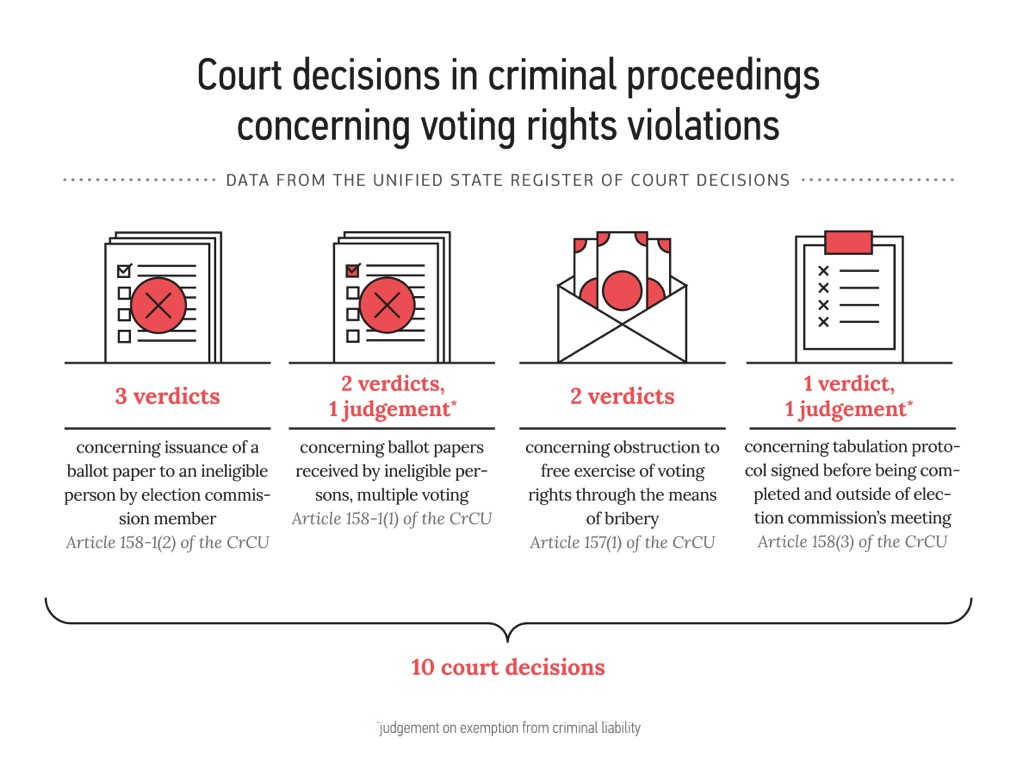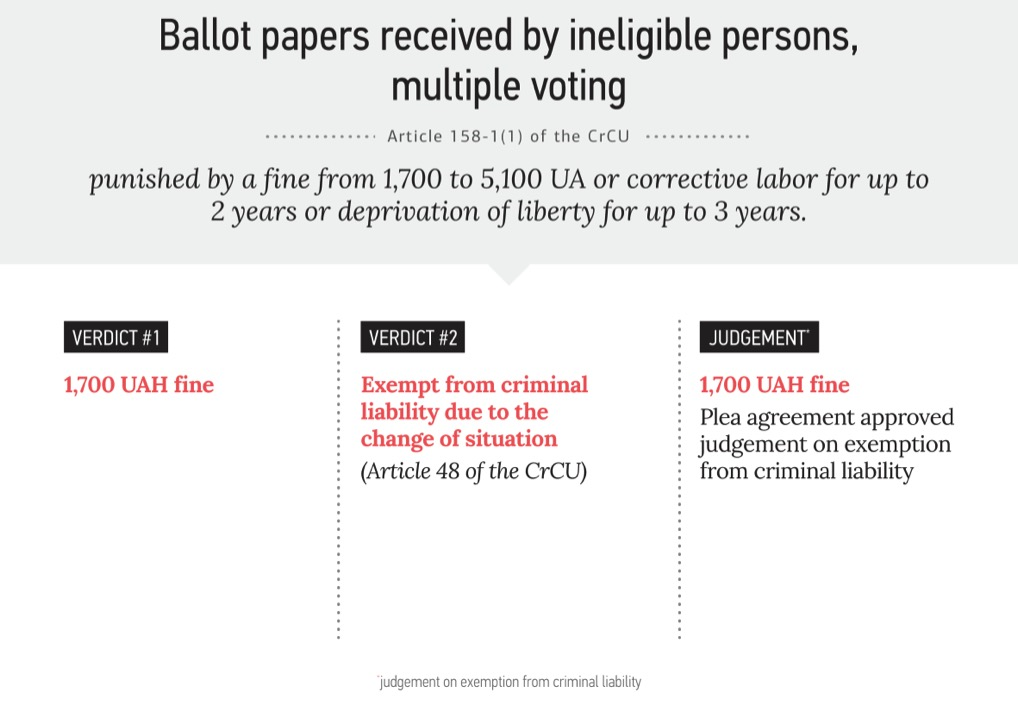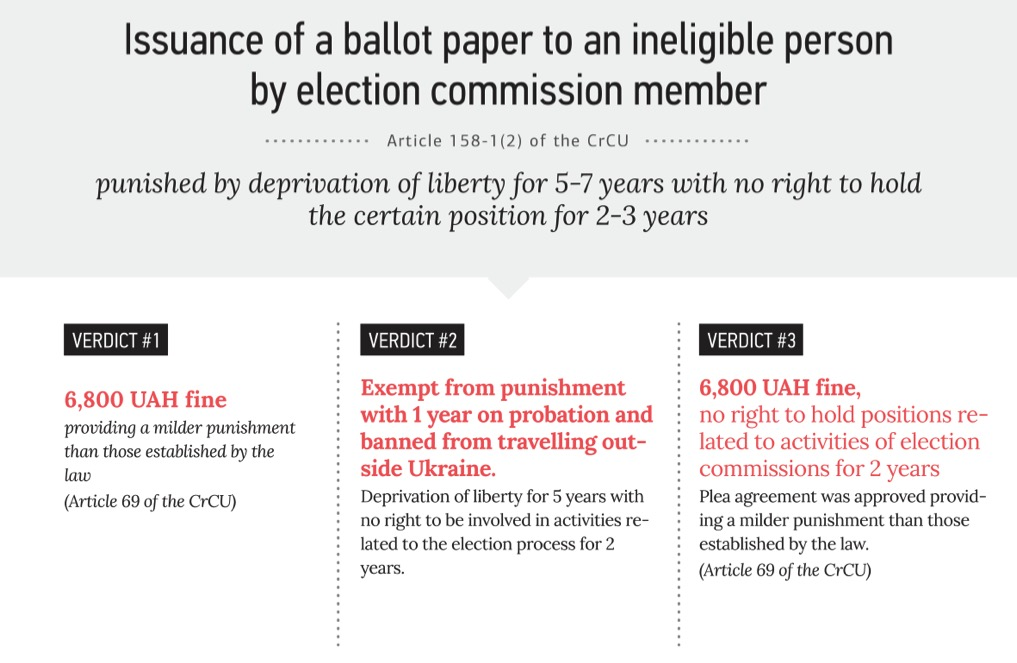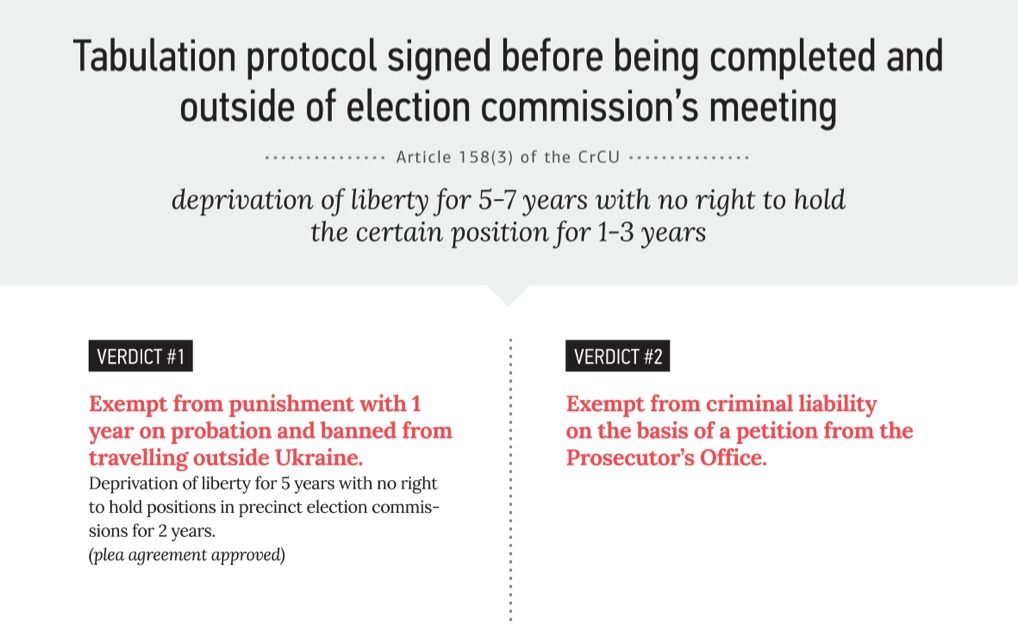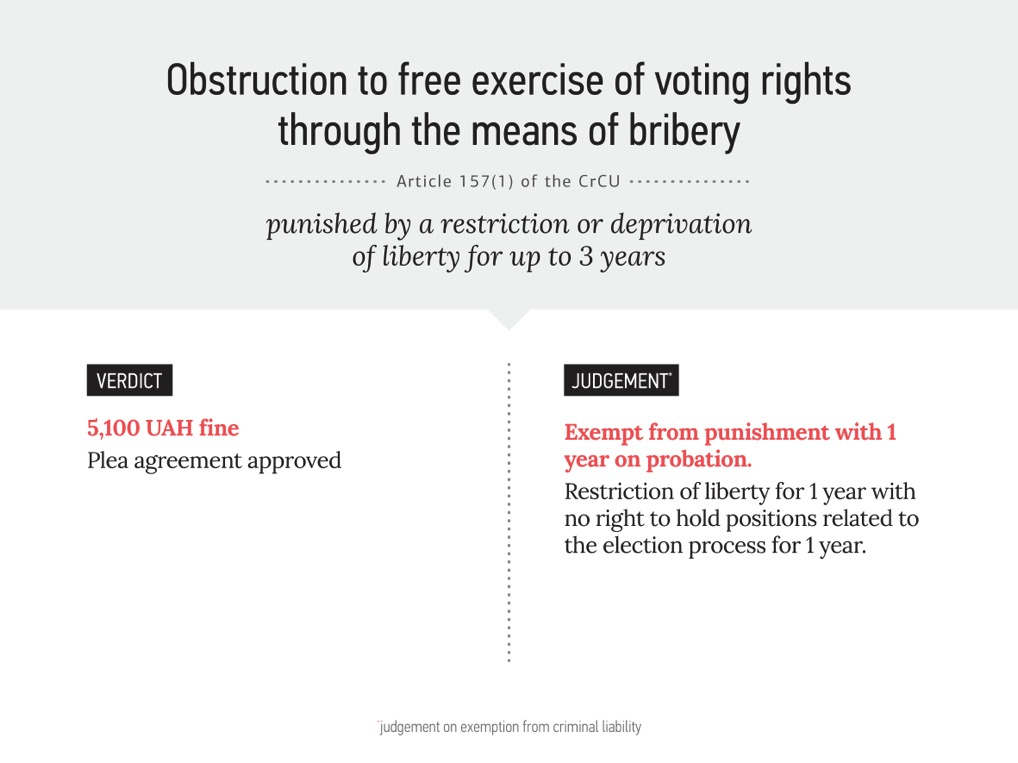Results of monitoring of activity of law enforcement and judicial institutions in Ukraine, conducted during February-June 2015 by Civic Network OPORA in partnership with the International Foundation for Electoral Systems (IFES), indicate that over 75% of criminal proceedings started during early parliamentary elections in Ukraine in 2014 were ineffective.
222 out of 291 criminal proceedings for offenses against citizens' electoral rights have already been closed as of June 2015. Only 4.5% of all criminal proceedings (13 out of 291 proceedings) have come to trial. Moreover, an agreement on guilt recognition was concluded between prosecutors and defendants in 2 out of 13 criminal proceedings.
There are 55 criminal proceedings concerning crimes against electoral rights of citizens, which have not been completed and the investigations are still pending. Most of these proceedings were recorded in Donetska oblast (26), Kyivska oblast (18) and in the city of Kyiv (14).
INTERNAL POLITICAL AND INTERNATIONAL OBLIGATIONS OF UKRAINE IN ENSURING INEVITABILITY OF PUNISHMENT OF CRIMES AGAINST ELECTORAL RIGHTS OF CITIZENS
Domestic transformation in 2014-2015 and international context of Ukraine’s reforms have raised questions regarding the ability of Ukrainian state to provide proper electoral standards. Special elections to the Verkhovna Rada of Ukraine on 26 October 2014 as well as the presidential elections in Ukraine held last year in May were compared to the previous election periods by national and international observers. The quality of the electoral process after the change of power in Ukraine that resulted from mass civil actions in late 2014 - early 2015 should have proved or disproved the ability of new leadership of the state to guarantee electoral rights of citizens.
International reactions to the early parliamentary elections
in Ukraine held on 26 October 2014
The course of early election campaign in 2014 showed that Ukraine has made some progress in conducting elections, which meet the principles of electoral law, rule of law, political pluralism and specificity, publicity and transparency. In particular, the Statement of preliminary findings and conclusions of International Election Observation Mission concerning early elections to the Verkhovna Rada of Ukraine, which was prepared thanks to joint efforts of the OSCE/ODIHR OSCE PA, PACE, European Parliament (EP) and the NATO Parliamentary Assembly, confirmed that the early parliamentary elections in Ukraine were an important step in Ukraine’s efforts to hold democratic elections in accordance with international obligations. The positive aspects of the election process highlighted in the Statement included impartial and efficient work of the CEC, high level of competition among the participants, the presence of a genuine choice for citizens, as well as general respect for fundamental freedoms[1]. It was noted in the Statement that the abuse of administrative resources was not the key issue in comparison with the parliamentary elections in 2012. At the same time the Ukrainian State was urged to remove deficiencies in the rule of law.
Recommendations regarding the need for further consolidation of progress in meeting the standards of the electoral process were included in the Final Report of OSCE/ODIHR Election Observation Mission during early parliamentary elections in Ukraine held on 26 October 2014. In particular, these recommendations include the need for prompt investigations concerning all acts of violence and intimidation against actors of the electoral process to be conducted in an independent and impartial manner and bringing the perpetrators to justice. In addition, a corresponding package of coordinated anti-corruption measures should be introduced to further ensure the integrity, transparency, accountability and the rule of law in election commissions[2]. According to the conclusions of OSCE/ODIHR Mission, actors of the electoral process should make stronger efforts to prevent the use of civil servants for obtaining unfair advantage in the electoral process during the election campaign period, which means that the abuse of administrative resources remains a live issue today.
Conclusions of national observers to the parliamentary elections – 2014
Domestic observers also noted the progress of Ukraine in ensuring the standards of elections, but the number of violations recorded by them, provide evidence of significant problems that accompanied early parliamentary elections.
According to the official observers of Civic Network OPORA, the pattern of violations has changed significantly during early parliamentary elections in Ukraine held on 26 October 2014 in comparison with the regular election in 2012. Thus, abuse of administrative resources[3] was the most common violation of law in 2012, while during the early parliamentary elections in Ukraine in 2014 actors of the electoral process violated the rules for election campaigning more often (violations were mainly manifested by the distribution of election campaign materials without output data).
At the same time, election bribery was one of the most common types of violation during the parliamentary elections in 2014, just like in 2012 (195 facts, which have signs of voter bribery, were revealed). OPORA observers reported that voter bribery mainly manifested itself as provision of money, goods and services by candidates for People’s Deputies of Ukraine to the voters during the election campaign. 124 cases of criminal (coercive) interference in the electoral process (mostly by way of causing damage to property and campaign materials), 107 facts of use of administrative resources in elections (dominated by cases of illegal involvement of officials in the campaign), 21 incidents of interference with the activities of journalists and official observers (most often such incidents referred to non-admission of journalists and official observers to the meetings of election commissions) were recorded during early parliamentary elections.
OPORA observers have recorded 21 attempts of falsification of election documents. In this context, facts of improper emendations to vote count protocol at the polling station were mostly recorded. In addition, OPORA has revealed 165 cases of procedural violations that were made by election commissions and other parties to electoral process, state authorities and local governments without clear intent to violate the legitimate electoral process. Overall, OPORA has recorded 1114 facts that have signs of violations of the Law of Ukraine “On Elections of People's Deputies of Ukraine” and/or the Criminal Code of Ukraine during the entire period of the electoral process.
Efforts of public authorities to prevent crimes against the electoral rights of citizens and ensure the inevitability of punishment for committing such crimes
The state, as well as the judicial and law enforcement authorities, plays a crucial role in prevention of crimes against the electoral rights. Public authorities and public law enforcement officers showed their willingness to prevent electoral crimes and ensure the effective investigation of illegal acts during the early parliamentary elections in Ukraine held on 26 October 2014. In particular, over the course of election process the Ministry of Internal Affairs of Ukraine has been administering a special interactive map, which recorded messages and statements about violations of the law during these elections. According to the data, which was included on the map of MIA of Ukraine, 509 cases with signs of criminal offense and 73 events with signs of administrative violations were recorded during the electoral process. According to the Kyiv municipal department and Oblast Departments of the Ministry of Internal Affairs of Ukraine, law enforcement agencies have received 1902 appeals on violation of election law during the electoral process.
In September 2014, operational headquarters were established for detecting and preventing violations of law as well ensuring safety measures during the elections according to the decision of the interdepartmental meeting at the National Security and Defense Council of Ukraine. Operational headquarters structure, created on the basis of the structures of Ministry of Internal Affairs of Ukraine, carried out its activities at the national and local levels. At the same time OPORA observers noted that the operational headquarters began to play an active role in the electoral process only a week before the polling day. A selector meeting chaired by Minister of Internal Affairs Arsen Avakov and involving representatives of the Security Service, Prosecutor General's Office was held on the 21st of October to discuss the issue of prevention of electoral offenses. Consequently, the Minister of Internal Affairs of Ukraine Arsen Avakov took over official responsibility for the effective reaction of law enforcement bodies to violations of law and crimes committed against electoral rights of citizens.
The Verkhovna Rada of Ukraine has adopted a Law of Ukraine “On Amendments to the Criminal Code of Ukraine (concerning the strengthening of responsibility for violation of electoral rights of citizens)” on the 14th of October, 2014 in response to the growing number of acts with signs of crime against electoral rights of citizens. In particular, the Law has distinguished voter bribery as a separate essential element of offense and established legal liability for both giving a bribe and for receiving it (i.e., legal liability for voters). The Law also envisages legal liability for campaigning by means of providing improper advantage or free goods to enterprises, institutions, organizations (except goods containing visual images of names, symbols, flags of political parties, the value of which does not exceed 3% of the minimum wage), works and services. The amendments to the Criminal Code have strengthened the liability for crimes against the electoral rights of citizens in order to overcome undue liberalization of criminal legislation in this area. However, the President has signed the Law of Ukraine “On Amendments to the Criminal Code of Ukraine (concerning the strengthening of responsibility for violation of electoral rights of citizens)” only on the 20th of October, 2014 (six days before the election day at the early parliamentary elections in Ukraine), which made it impossible to apply measures of strengthened liability to the majority of violations recorded during the election process.
Campaigning experience in Ukraine proves the need for ensuring effective inevitability of punishment of the perpetrators of crimes against electoral rights of citizens, without which none of the improvements to relevant legislation will lead to raising the standards of the electoral process. Dependence of the quality of electoral process on the political context, rather than legal factors, does not allow consolidating the progress towards true and fair elections.
As of the end of June 2015, 8 months have passed already since the polling day at the early parliamentary elections in Ukraine. During this period the bodies of internal affairs should have shown specific results of investigation of crimes against the electoral rights of citizens to the public.
Civil Network OPORA supported by the International Foundation for Electoral Systems (IFES) hereby presents the first issue of the newsletter concerning interim results of the investigation of crimes against the electoral rights of citizens committed during early elections of People’s Deputies of Ukraine held on 26 October, 2014
THE RESULTS OF INVESTIGATION OF CRIMINAL PROCEEDINGS CONCERNING CRIMES AGAINST ELECTORAL RIGHTS OF CITIZENS. INTERIM EVALUATION OF EFFECTIVENESS OF LAW ENFORCEMENT AND JUDICIAL INSTITUTIONS
Starting from February 2015, OPORA has been sending requests every month to the Central Investigation Department of MIA of Ukraine, regional departments of the Interior Ministry of Ukraine and has been carrying out continuous monitoring of web-site of Unified State Register of Court Decisions within the framework of monitoring of activities of law enforcement and judicial institutions concerning investigation of crimes against electoral rights of citizens.
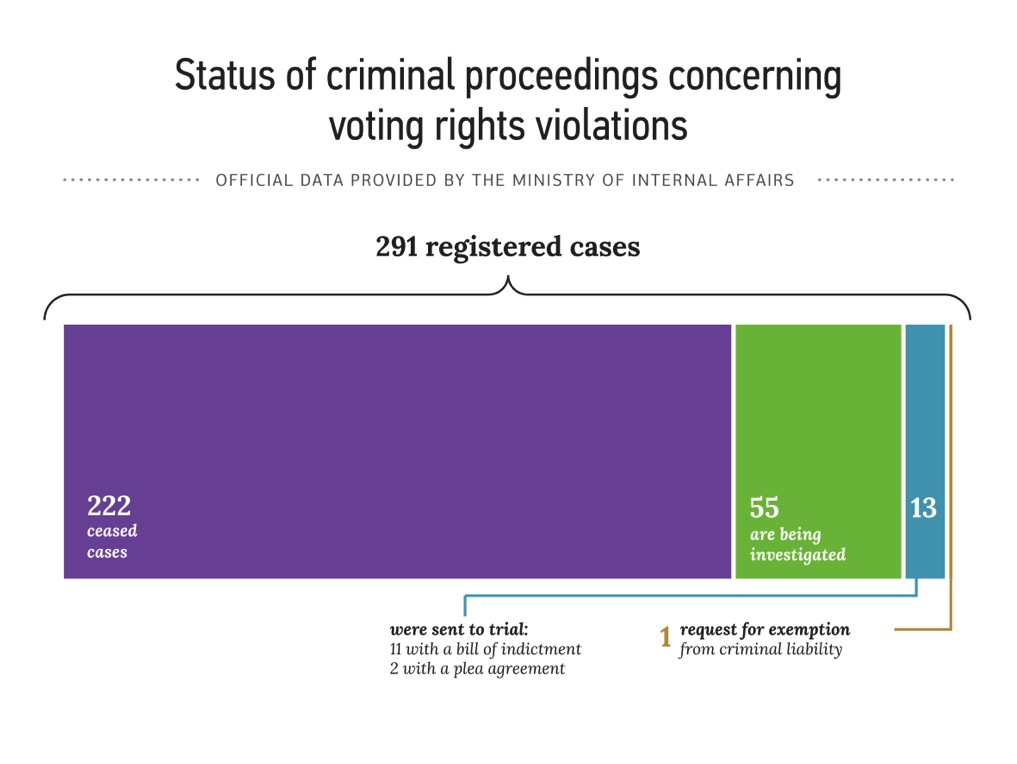 As of June 24, 2015 the bodies of internal affairs of Ukraine initiated 291 criminal proceedings under Articles 157-160 of the Criminal Code of Ukraine.
As of June 24, 2015 the bodies of internal affairs of Ukraine initiated 291 criminal proceedings under Articles 157-160 of the Criminal Code of Ukraine.
According to the Central Investigation Department of MIA of Ukraine, the largest number of criminal proceedings were initiated under Article 157 of the Criminal Code of Ukraine (Obstruction of electoral rights or the right to take part in a referendum, hindering activities of the election commission or the commission on the conduct of referendum or hindering activities of an official observer) - 181 criminal proceedings.
The second most common criminal proceedings were initiated under Article 158 of the Criminal Code of Ukraine (Providing false information to the authority maintaining the State Register of Voters or falsification of electoral documents, referendum documents, election results or the data of the State Register of Voters) - 46 criminal proceedings.
The third most common criminal proceedings were initiated under Article 160 of the Criminal Code of Ukraine (Bribing a voter or a referendum participant) - 37 criminal proceedings. By contrast, only 17 criminal proceedings were launched under Article 158-1 of the Criminal Code (illegal use of voting papers or referendum ballots, voter or referendum participant voting more than once), 9 criminal proceedings were started under Article 159-1 of the Criminal Code (Violation of procedure for financing campaigns of candidates, political parties (blocs), 1 criminal proceeding was initiated under Article 158-2 (unlawful destruction of election documents or referendum documents).
It should be noted that there were no criminal proceedings initiated under Article 159 of the Criminal Code (violation of the secrecy of the vote).
As of June 24, 2015, pre-trial investigations were effectively completed only in 13 out of 291 criminal proceedings. This is equivalent to 4.5% of all criminal proceedings initiated on the basis of acts featuring offenses against electoral rights. Indictments were sent to court without an agreement on the recognition of guilt (under Article 291 of the Code of Criminal Procedure of Ukraine) in 11 out of 13 completed criminal proceedings. Indictments, filed in court, most often related to criminal responsibility under Article 158-1 (illegal use of voting papers or referendum ballots, voter or referendum participant voting more than once) – 6 occasions, and least often to criminal responsibility under Article 157 of the Criminal Code of Ukraine (Obstruction of electoral rights or the right to take part in a referendum, hindering activities of the election commission or the commission on the conduct of referendum or hindering activities of an official observer) – 1 occasion.
Two indictments were sent to court both under Article 158 (Providing false information to the authority maintaining the State Register of Voters or falsification of electoral documents, referendum documents, election results or the data of the State Register of Voters) and Article 160 (Bribing a voter or a referendum participant).
On the other hand, agreements on recognition of guilt of the accused persons were sent to the court in 2 out of 13 criminal proceedings (under Article 469 of the Code of Criminal Procedure of Ukraine). One agreement dealt with the criminal offense under Article 157 of the Criminal Code of Ukraine (Obstruction of electoral rights or the right to take part in a referendum, hindering activities of the election commission or the commission on the conduct of referendum or hindering activities of an official observer), while the other concerned the criminal offense under Article 158-1 (illegal use of voting papers or referendum ballots, voter or referendum participant voting more than once). Agreement on recognition of guilt includes unconditional recognition of guilt for committed crime by the suspect or the accused, agreed punishment and consent of the accused person with agreed punishment or on sentencing and exemption from serving a sentence with a probationary period. Moreover, the conclusion of an agreement between the prosecutor and the accused and its approval by the court leads to the restriction of the right to appeal the corresponding sentence.
222 criminal proceedings were closed based on the results of preliminary investigation pursuant to Article 284 of the Code of Criminal Procedure of Ukraine. This means that more than 76% of all criminal proceedings initiated during early parliamentary elections in Ukraine have ended without any effect.
Table 1. “Closed criminal proceedings that were initiated during early elections of People’s Deputies of Ukraine-2014 by Articles of Criminal Code o Ukraine”
|
Under the art.157 |
Under the art.158 |
Under the art.158-1 |
Under the art.158-2 |
Under the art.159-1 |
Under the art.160 |
|
165 |
16 |
4 |
1 |
130 |
As of June 26, 2015, investigations are pending in 55 criminal proceedings (almost 19% of the total number of proceedings).
Table 2. “Criminal proceedings initiated during early elections of People’s Deputies of Ukraine-2014 with pending investigations, (June 2015),
by Articles of Criminal Code o Ukraine”
|
Under the art.157 |
Under the art.158 |
Under the art.158-1 |
Under the art.158-2 |
Under the art.159-1 |
Under the art.160 |
|
4 |
22 |
5 |
1 |
6 |
17 |
Criminal proceedings initiated during early elections in 2014 by regions
The largest number of criminal proceedings during the early parliamentary elections in Ukraine was initiated in the city of Kyiv (52), Donetska oblast (50) Odeska oblast (41), Chernihivska oblast (28), Kharkivska oblast (20). On the other hand, the largest number of incriminating acts was sent to the court in Dnipropetrovska, Cherkaska, Zhytomyrska and Khmelnytska oblasts (2 indictments in each of these oblasts). One indictment act was sent to the court in each of the following regions: Donetska, Odeska, Vinnytska, Rivnenska, Ternopilska oblasts.
The largest number of uncompleted criminal proceedings with pending investigations was recorded in Donetska oblast (26), Kyivska oblast (18) and the city of Kyiv (14). At the same time, there were no criminal proceedings with pending investigations remaining in Cherkaska, Zhytomyrska, Khmelnytska, Ternopilska, Chernihivska, Zaporizka, Sumska, Zakarpatska, Volynska, Lvivska, Chernivetska, Ivano-Frankivska oblasts as of June 2015.
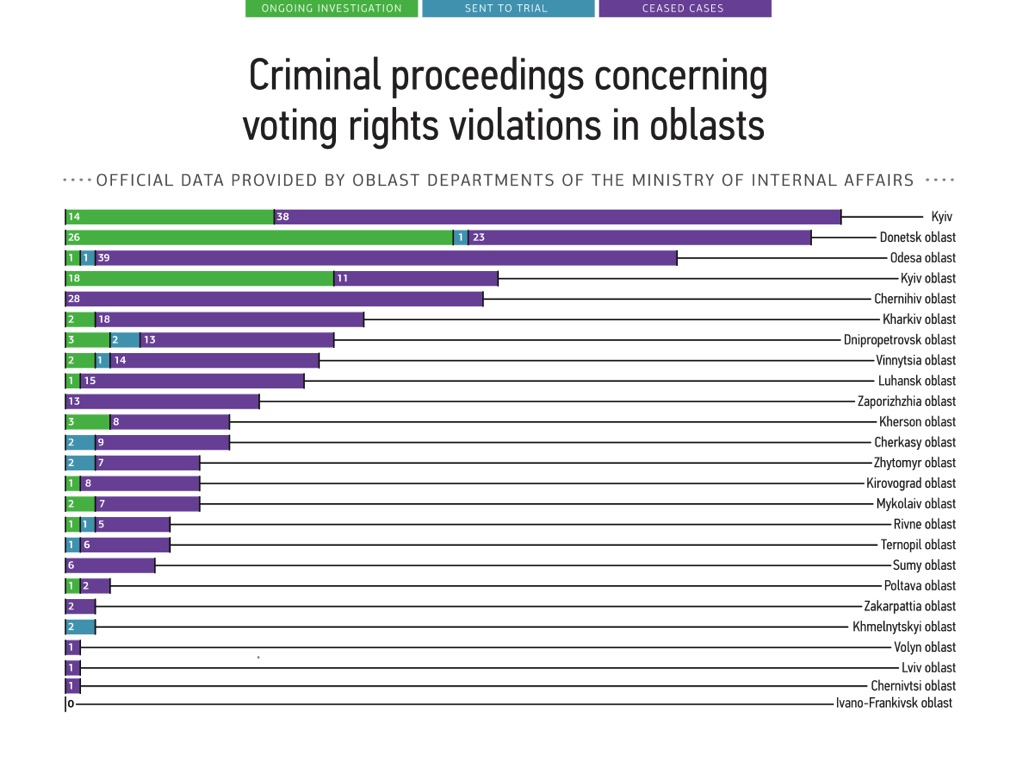
ANALYSIS OF LEGAL CONSEQUENCES OF ACTIVITIES OF LAW ENFORCEMENT AND JUDICIAL INSTITUTIONS IN THE SPHERE OF INVESTIGATION AND SENTENCING FOR CRIMES AGAINST ELECTORAL RIGHTS OF CITIZENS
Problems of law enforcement practice related
to improper application of the law
1. The grounds for closure of criminal proceedings were analyzed. In most cases, law enforcement officers have closed the proceedings under clause 2 of part 1 of Article 284 of the Criminal Code of Ukraine (absence of the event of a crime was established). But there were also some cases (in particular, criminal proceedings regarding violations in 102nd electoral district in Kirovohradska oblast) when criminal procedures were closed according to clause 4 of part 1 of Article 284 of the Criminal Code of Ukraine (enactment of a law which abolished criminal liability for an act committed by a person). It bears reminding that on the 19th of October, 2014, the President of Ukraine has signed the Law “On Amendments to the Criminal Code of Ukraine concerning strengthening of responsibility for violation of electoral rights of citizens”, which was earlier adopted on the 14th of October, 2014. This law excluded the phrase “by bribing” from Article 157 of the Criminal Code of Ukraine (“bribery” was recognized as a method of obstruction of electoral rights), but set out a new version of Article 160 of the Criminal Code of Ukraine as follows: “bribing a voter or a referendum participant”. Thus, bribery became a separate crime instead of being just a method of obstruction of electoral rights.This change does not mean the decriminalization of bribery. On the contrary, a law that strengthens legal liability for bribing came into force on the 23rd of October. Since the criminal law that strengthens liability has no retroactive effect and the act of bribery was not decriminalized, investigation should be completed in accordance with part 1 of Article 157 of the Criminal Code of Ukraine. In reality, improper application of the law has resulted in closure of criminal cases due to abolition of criminal liability in the context of adoption of the Law on strengthening legal liability.
2. Only direct perpetrators of crimes who admitted their guilt in the process of investigation were brought to justice. An agreement on the recognition of guilt was concluded in four out of 10 cases published in the Unified State Register of Court Decisions, and there was also one case, in which law enforcement bodies have sent a request for exemption from criminal liability.
2.1. There were no accusations presented in any of the criminal proceedings concerning voter bribing and none of the organizers of bribery schemes or persons, in whose favor crime “pyramids of bribery” were organized or “voting carousels” were planned, have been punished. Prosecution was fragmentary in comparison with the scale and scope of bribery activity (http://www.reyestr.court.gov.ua/Review/42636190;http://www.reyestr.court.gov.ua/Review/41897917);
2.2. In cases concerning illegal issuance of ballot papers only one member of the election commission was brought to responsibility, although according to part 3 of Article 85 of the Law of Ukraine “On Elections of People's Deputies of Ukraine” as many as two members of the precinct election commission should enable the voter to vote during the election day at the polling station: (one member of PEC provides the voters’ list for the signature; the second member of the precinct election commission writes his/her name in, signs and affixes a progressive number under which the voter was included in the voters’ list at the polling station in marked spaces of counterfoils). Thus, this crime could have been committed either with the criminal participation of member of PEC responsible for the voters’ lists, or the head of PEC did not carry out division of responsibilities between the members of PEC on election day in accordance with the requirements of the Law, which led to the possibility of committing this crime by one person (http://www.reyestr.court.gov.ua/Review/42604570);
2.3. Actions of member of the precinct election commission who allowed issuing of ballot paper to a person, who had no right to receive it, were justified in the judgment of court by “inattentiveness ... due to voters flocking near the last”. The investigation concerning actions of member of precinct election commission, who issued a ballot paper to a person, who had no right to receive it, was not conducted; the charge was served only on a person who received the ballot paper illegally and acknowledged his guilt (http://www.reyestr.court.gov.ua/Review/41883924).
2.4. In the case concerning the signing of blank vote count protocol by members of the election commission and filling in missing data outside meeting place of precinct election commission not only the three members of PEC directly involved in rewriting the protocol in the premise of DEC should be held liable, but also those members of commission and candidate proxies who agreed to sign the blank protocol prior to filling in the results of vote counting. From our point of view, such actions are within the scope of application of part 3 of Article 158 of the Criminal Code of Ukraine (the signing of the vote count protocol prior to filling in the results of vote counting) (http://www.reyestr.court.gov.ua/Review/42426453).
3. Currently there is a trend towards giving more lenient sentences than specified by the sanction of article or giving mandatory minimum sentences as provided by sanction. Thus, 3 out of 10 sentences recorded in the Unified State Register of Court Decisions gave more lenient punishments than envisaged by Article 69 of the Criminal Code of Ukraine or due to an agreement on the recognition of guilt; in other 3 cases persons sentenced to confinement or personal restraint were exempted from serving a sentence with a probationary period of 1 year; in 2 cases accused persons were exempted from criminal liability due to the change of conditions (Article 44 of the Criminal Code of Ukraine) and at the request of prosecutors (according to the procedure specified in part 2 of Article 286 of Code of Criminal Procedure of Ukraine); in 2 cases mandatory minimum punishments were imposed according to sanction of article - a penalty amounting to 100 non-taxable minimums (1700 UAH).
4. In some areas there is some disparity between the number of submitted crime incident reports and information regarding the event, which may contain signs of a crime, and the number of registered criminal proceedings (in particular, in Volynska, Zhytomyrska, Mykolaivska oblasts). On the one hand, this indicates the lack of knowledge shown by the applicant (who must emphasize that he or she submits a crime incident report and requests its registration in the Unified Register of Pre-trial Investigations). On the other hand, the large number of reports examined in accordance with the procedures specified by the Law on Applications from Citizens, may indicate the reluctance of law enforcement agencies to register criminal proceedings, which can be closed potentially.
The problems of law enforcement practice, which require amendments to current legislation
We have identified a number of problems and developed the following proposals:
1. The voters list and the counterfoils of ballot papers are not recognized by the investigative authorities as election documentation. Such law enforcement practice has a direct effect on the measure of punishment, which will be chosen by the courts for convicted persons. If voters’ lists were recognized as the election documents, persons found guilty of issuing ballot papers to the voter, who had no right to receive it, by means of signature forgery in the voters’ list and the counterfoil, would have been accused of crimes collectively determined by Article 158-1 of the Criminal Code of Ukraine and part 2 of article 158 (falsification of election documents). In most cases, the act of forgery of signatures was only described in case materials, but did not have any effect on the classification of crime. Only in decision № 42604570 of Unified State Register of Court Decisions we come across signature forgery, which is classified as falsification of official documents, but not election documents.
Proposal of Civic Network OPORA for improvement of legislation:
Include “Definitions” article in the Law of Ukraine “On Elections of People's Deputies”, Law of Ukraine “On Local Elections”, Law of Ukraine “On the Election of the President of Ukraine”, which will determine the list of election documents. Election documents should include the following: regulations, protocols, decisions and acts of election commissions, voters’ lists, ballot papers and other documents used by election commission in the process of preparation and voting, counting of votes and certification of election results.
Alternative: The list of election documents may be specified in the note to Article 158 of the Criminal Code of Ukraine (falsification of election documents) instead of special election laws.
2. An exemption from liability was frequently applied, when imposing a punishment for acts of crime related to violation of electoral law, on the basis of recognition of the fact that such act does not pose a risk to the public anymore or the accused person has ceased to be socially dangerous at the time of criminal proceedings due to change of conditions (Article 48 of the Criminal Code of Ukraine). Such interpretation of criminal offenses committed during the elections led to impunity for those who committed the corresponding offenses.
Since the election process is cyclic, we can’t interpret the end of a particular electoral process as a change of conditions, which means that the offense does not pose a risk to the public anymore (for example, in decision №41883924 of Unified State Register of Court Decisions the court has a applied an exemption from liability for making a vote for another person). If there are any extenuating circumstances, the accused person must still suffer the negative consequences of committed offense through being awarded the mandatory minimum punishment specified by sanction of an article or by means of enforcement of Article 69 of the Criminal Code of Ukraine (imposing a more lenient punishment than envisaged by law). This particular punishment may be in the form of a penalty amounting to 100 non-taxable minimums - 1700 UAH (for example, a similar punishment was awarded as a mandatory minimum in decisions № 42410563, 42084983 of Unified State Register of Court Decisions).
Proposal of Civic Network OPORA for improvement of legislation:
To amend Article 48 of the Criminal Code of Ukraine by making provision for the impossibility of application of this Article to acts of crime envisaged by Articles 157-160 of the Criminal Code of Ukraine.
3. Quite often the courts have reasonably chosen deprivation of the right to occupy positions in the election commissions for a period from 1 to 3 years as an additional penalty for the accused person.
Deprivation of the right to occupy positions in the election commissions is often used as an additional punishment in proceedings concerning offenses against the electoral rights of citizens. The decisions of the courts include absolutely inappropriate references to a particular type of election commission, in which the guilty person is deprived of the right to hold position (for example, the decision №42426453 of Unified State Register of Court Decisions – deprives the person of the right to occupy positions in precinct election commissions during the elections for a period of 2 years). Such formulation does not actually deprive these persons of a right to participate in the activities of district and territorial election commissions.
The additional punishment of deprivation of the right to hold office in the election commissions under Article 55 is awarded for a period of 1 to 3 years, but most regular elections in Ukraine are held once every 5 years ago, which means that disqualification to hold office in the election commissions under sentence for a period of 1 to 3 years (Decisions № 42426453, 42604570, 42470585 of Unified State Register of Court Decisions) may lead to the possibility for such convicted persons to become members of election commissions at the next regular election.
The additional penalty of deprivation of the right to engage in activities related to the election process and referendum should be imposed in case of committing any and all offenses against the electoral rights of citizens, not just those committed by a member of the election commission or the commission of referendum.
Proposal of Civic Network OPORA for improvement of legislation:
To insert into part 1 of Article 55 an additional paragraph 3 to read as follows: “Deprivation of the right to occupy positions in the election commissions, as well as deprivation of the right to be an official observer, proxy or authorized representative of a party to electoral process, and engage in other activities related to the election process and referendum for a period of ten years”.
To insert additional sanctions into part 1 of Article 157, part 1 of Article 158-1, part 1 of Article 158-2, part 1 of Article 159, parts 1-3 of Article 159-1, part 1 of Article 160 of the Criminal Code of Ukraine to read as follows: “deprivation of the right to engage in activities related to the electoral process and referendum for a period of ten years”. To delete the words “with disqualification to hold certain positions or engage in certain activities for a period of one to three years” and insert the words “with deprivation of the right to engage in activities related to the election process and referendum for a period of ten years” in sanctions of parts 2-4 of Article 157, parts 2-4 of Article 158, part 2 of Article 158-1, part 2 of Article 158-2, part 2 of Article 159, parts 1-3 of Article 159-1, parts 2-4 of Article 160, to delete the words “or without disqualification as such” in part 2 of Article 158-2.
The problems of access to public information
1. Civil Network OPORA has discovered problems with citizens’ access to information on published decisions. There is information available about beginning of the trial in several criminal proceedings in the Unified State Register of Court Decisions (№ 283/3560/14-к, № 703/540/15-к). However, the final decisions themselves are absent in the Unified State Register of Court Decisions. Civic Network OPORA has requested the State Judicial Administration of Ukraine to provide information on trial phase of criminal proceedings. The State Judicial Administration in its response to our request has noted that the responsibility for the improper publication of court decisions lies on the shoulders of the president of the court. According to Article 212-3 of Code of Administrative Offences of Ukraine “Failure to provide access to a court decision or case materials at the request of the person as well as any other violation of the Law of Ukraine “On access to court decisions” – invokes imposing a fine on officials amounting to a sum from 425 to 850 UAH. Moreover, the protocol on administrative violation is prepared by commissioners for Human Rights of the Secretariat of the Verkhovna Rada or commissioners for Human Rights of the Verkhovna Rada of Ukraine. In our opinion, it is necessary to provide the State Judicial Administration with the function of control on correspondence between the number of cases considered by court and the number of published court decisions, and also authorize it to prepare protocols on an administrative violation.
2. We did not receive any responses to the requests to the local police department in Kirovohradska oblast. The municipal police department in Kyiv has responded with a delay and not in full (the response did not include the requested detailed information in terms of qualification of crimes against the electoral rights of citizens).
3. The requested information submitted in the responses from the Ministry of Internal Affairs and its main regional departments contradicts one another and also contradicts the data of the Unified State Register of Court Decisions. For example, according to the Unified State Register of Court Decisions, the District Court in Olevskiy rayon of Zhytomyrska oblast has been considering the case materials of criminal proceeding №12015060260000059 upon the application for exemption from criminal liability, received on the 31st of March, 2015, while the department of Ministry of Internal Affairs in Zhytomyrska oblast in its two responses to the requests for information has reported that it did not send any applications for exemption from criminal liability concerning crimes committed against electoral rights of citizens to the court.
Conclusions
The information on the progress of investigation and sentencing in criminal proceedings for offenses against electoral rights of citizens is an issue of great public importance. Impunity of persons, in particular, those, who were found guilty of organizing massive bribery of voters, deepens public distrust of capacity of public authorities to carry out effective reforms in the near future, on the one hand, and maintains the confidence of the organizers and perpetrators of crimes regarding their absolute impunity for criminal actions and their opportunities to escape punishment by using corruption mechanisms, on the other hand. Only through constructive dialogue between civil society, law enforcement and judicial institutions can we identify deficiencies of the existing system of investigation and prosecution and also work out proposals to improve legislation and law enforcement practice. At the same time the public must ensure effective control on efficient investigation in those 55 criminal proceedings, where pre-trial investigation is still pending.
This report was produced with technical assistance from the International Foundation for Electoral Systems (IFES) and support from the Canadian Department of Foreign Affairs, Trade and Development (DFATD) and US Agency for International Development (USAID). The views expressed in this report do not necessarily reflect the views of IFES, DFATD, or USAID.
